“Honesty is the best policy” was penned by Sir Edwin Sandys in 1599. If you search for more quotes on truth, you’ll find wise words from William Shakespeare, Albert Einstein and Martin Luther King Jr. Even Marilyn Monroe and Elvis Presley have weighed in on truth. It’s not always easy to be honest, but lying to customers costs some business owners more than they realize. Customers almost always end up knowing the truth.
“People respect you more if they get the truth as opposed to a bunch of fluff.”
-Marcus
Why Do Companies Lie?
Companies have all sorts of motivations for lying or telling half-truths, but greed is one of the biggest. In dog-eat-dog industries, dishonesty often results in a big boost in sales. Keeping the fine print extra-fine pays. Glossing over a product’s flaws benefits the bottom line. However, lies usually come back to bite the companies that tell them. They’re often more expensive in the end than telling the truth. There are countless examples in the corporate world. A few years ago, a major automobile manufacturer had to pony up $25 billion in restitution, penalties and fines for installing software designed to get around diesel emissions testing. Back in the early 2000’s a major American energy company self-destructed after its phony holdings and bogus accounting practices came to light. Not only were customers and shareholders ripped off, but loyal employees watched their pensions go up in smoke.

Most companies, thankfully, aren’t that brazenly deceitful. They occasionally pull a fast one to protect their reputations or even their customers. For example, gas gauges in some cars were once calibrated to make it seem like the tank was closer to being empty than it really was. That way, the carmakers rationalized, drivers had a greater sense of urgency about finding a gas station. They insisted that their deliberate dishonesty was in customers’ best interests.
Well-intentioned people often lie because they fear the truth would be more harmful, but that rationale usually backfires. Consider this scenario: You own a boutique. A woman in the fitting room tries on a dress and asks for your opinion.
You immediately see that she’s made the worst possible choice. The cut accentuates her worst features. The color’s all wrong. It makes her look tired and sallow. You don’t have the heart to tell her the truth, so you tell her she looks terrific and make an easy sale. She wears the dress to work the next day. Lots of co-workers remark on the new outfit, but nobody pays her a compliment. The boss tells her she looks exhausted and asks if she’s all right.
You’ve probably lost a customer. When you’re tempted to tell a well-meaning lie, think of a more positive spin on the truth instead. “That’s one of my favorites too,” you might say, “but I have several more I’d love for you to try. I noticed your pretty green eyes when you came in, but that color distracts from them.” The woman may still choose the wrong dress, but she’ll keep shopping with you. Customers always appreciate honesty.
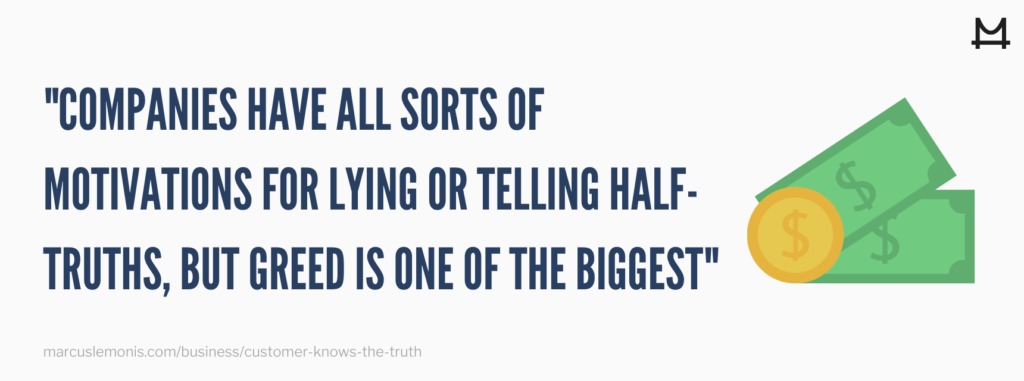
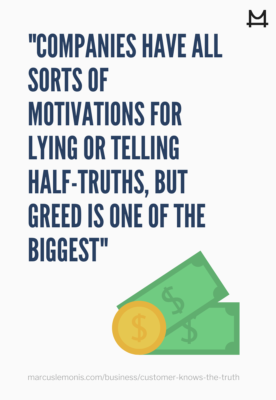
The Importance of Eradicating the Lies
There may be a short-term advantage to exaggerating results or promising something you’re not sure you can deliver. Whatever the benefit is in the moment, it’s not worth it in the long run. The truth has a strange way of eventually coming out. Maybe you tell a harmless fib or half-truth that doesn’t have much impact on a customer’s experience. What will happen, though, if the customer ever finds out you lied? Having egg on your face is the least of your worries. Even small, insignificant lies erode trust. The customer will wonder what else you’ve lied about and question everything you say going forward. He might even talk about what happened at his book club that night. He might post about the incident on social media.
Long-term, meaningful relationships are built on mutual trust. As Marcus says, you can “survive any downturn, any mistake, any problem” when you’ve proven that you can be trusted. Start thinking of truthfulness as your greatest asset as a business owner.
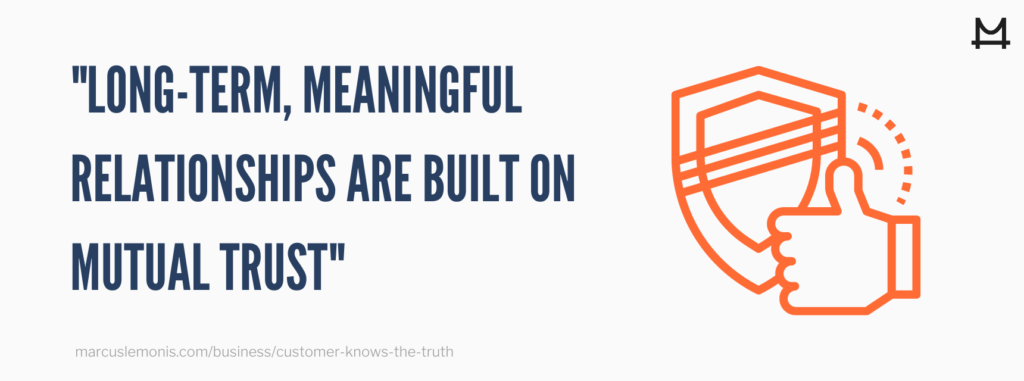
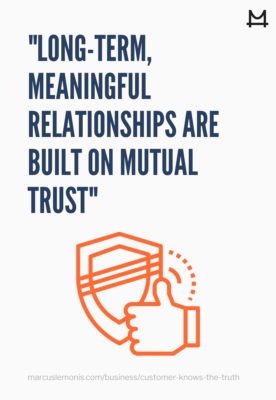
How to Leverage Honesty With Customers When Mistakes Are Made
Incredibly, some business owners would rather lose a customer than admit to a mistake. Maintaining a positive profile trumps honesty for them every time. That’s crazy. Coming clean about a goof-up often has surprisingly good results. Transparency and humbleness are rare these days. If you handle it correctly, your customer may be more impressed after a mistake than they were when things were going off without a hitch.
- Acknowledge the error quickly
- Own the mistake even if you didn’t make it
- Explain what you’re doing to correct the mistake
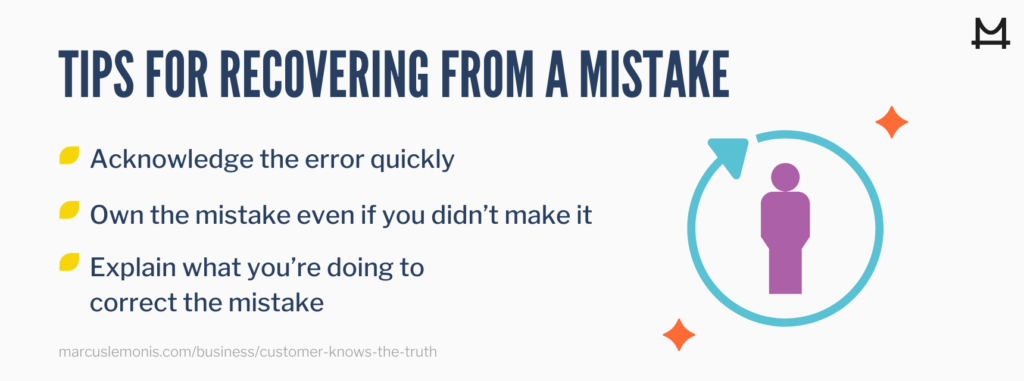
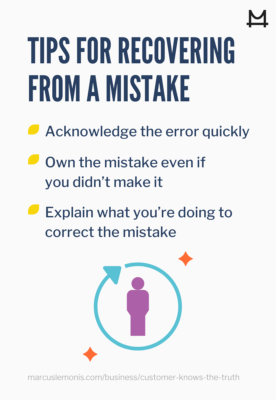
Timing is everything. If you realize you’ve dropped the ball somewhere, your customer should be the first to know. Don’t give yourself time to think about it. Just swallow your pride, and sincerely apologize: “I’m so sorry. I accidentally booked your reservation for 10 people instead of 12. I’d hate to lose good customers like you and will do everything I can to get you seated quickly. If you’d like to wait in the bar, I’ll send out some appetizers.” Customers don’t want to hear excuses. They don’t care if your chef walked out on Saturday night or your new produce company isn’t working out. It’s tempting to deflect blame to third parties, but it’s your name on the door. “People respect you more if they get the truth as opposed to a bunch of fluff,” says Marcus. In other words, fessing up is more impressive: “It’s come to my attention that your order was overlooked. Please forgive me.” Explain what you’re doing to resolve the mistake. You needn’t go into a lot of detail. You just want to demonstrate that you’re proactively trying to fix things: “I’ve replaced the order and will personally ensure that your steak au poivre is worth the wait. May I bring you another cocktail?”
Always continue to follow up until problems are resolved. This shows customers that you truly care and that you’re not happy until they’re happy. If you play your cards right, you can leverage honesty so that even mistakes work in your favor.

Stress Honesty Among Your Staff
Finally, model truth-telling in your company. Lying and secrecy are often widespread in troubled companies. For example, during a meeting with a Wisconsin-based food company, Marcus had questions about an employee whose role was unclear. The owner and the staff gave evasive answers or lied outright until the owner finally admitted that the employee was the operations manager. She and the owner were involved in some kind of romantic drama, and the owner was trying to minimize her role in the company when speaking with Marcus.
The operations manager eventually parted ways with the company as there was just too much baggage involved. Dishonesty inevitably affects morale, operations and customers. If you don’t establish a culture of truth-telling, expect lies to breed more lies. Science backs that up. In 2018, The Washington Post reported on a study of lying. Researchers found that lying alters the brain so that each lie gets easier to tell and more outlandish than the last.

The good news is that most people instinctively tell the truth. If you resist the temptation to tell that one little white lie, you’re not likely to become a chronic liar. Plus, you won’t have to remember every word you say the way liars do. You’ll sleep better at night. Being honest, even when it’s uncomfortable, also benefits your employees. They’ll never grow and develop new skills if you tell them only what they want to hear. When Marcus tried to help a California phone accessory company, he had no qualms about giving staff members a poor review after they gave a subpar performance when delivering an important product pitch. After a little whining, the employees admitted that they were unprepared and the constructive criticism ended up helping them be better prepared in the future.
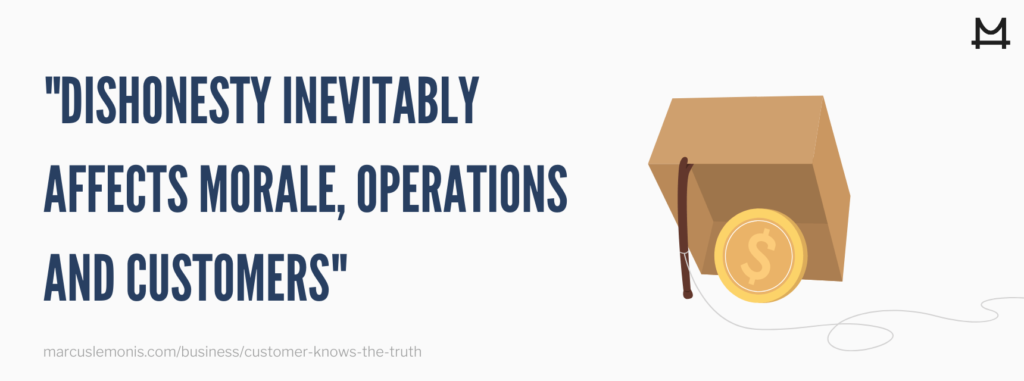
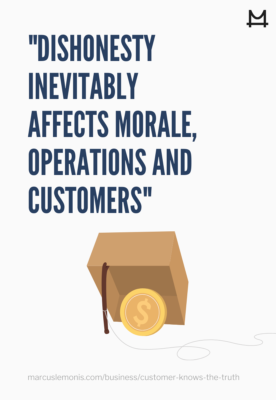
There’s no security in dishonesty and secrecy. Think of each true thing you say as a stone in the foundation of your company. The more stones you amass, the sturdier and more trustworthy your business will be. If you really want to wow customers, become known for always telling the truth.
- What are some ways you leverage the truth with your customers?
- What are some ways you can begin to develop trust among your customers?
Haqqi, T. (2019, December 19). 11 Companies that caught lying to the public, deceived customers.
Retrieved from https://finance.yahoo.com/news/11-companies-caught-lying-public-003658933.htmlSegal, T. (2020, September 22). Enron Scandal: The fall of a Wall Street darling.
Retrieved from https://www.investopedia.com/updates/enron-scandal-summary/Wan, W. & Kaplan, S. (2018, August 24). Why liars lie: What science tells us about deception.
Retrieved from https://www.washingtonpost.com/news/speaking-of-science/wp/2018/08/24/why-liars-lie-what-science-tells-us-about-false-statements/





